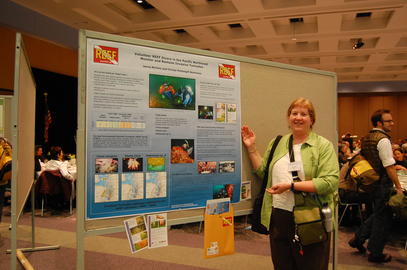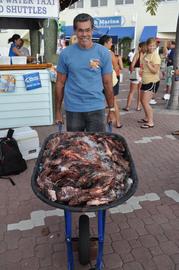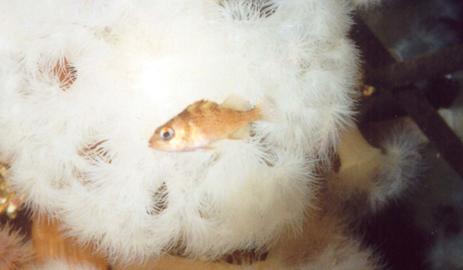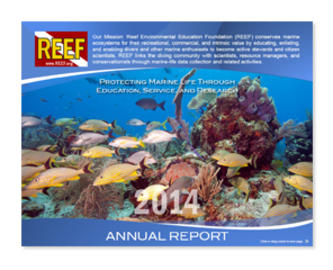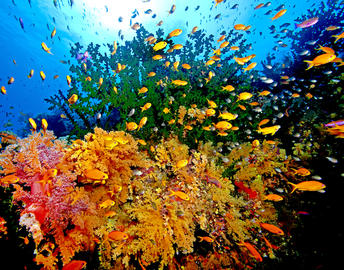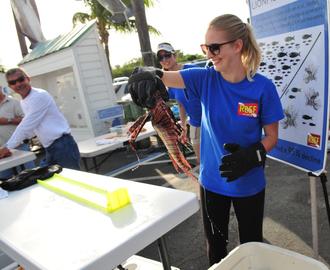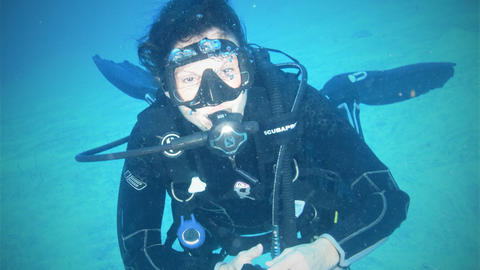Fish usually need to be caught to be measured, but scientists from the Grouper Moon Project and Cayman Islands government have used video camera systems to collect an impressive 17-year dataset of Nassau Grouper lengths from Little Cayman. We combined this with information on growth and abundance to produce a comprehensive assessment of Nassau Grouper on Little Cayman. We found that Nassau Grouper recovered on Little Cayman largely thanks to one strong year class from 2011 spawning, 4-8x average.
REEF staff and volunteers are attending several events in the Northwest this winter and spring to spread the word about the Volunteer Survey Project. These include scientific conferences and dive shows. REEF volunteer and instructor, Janna Nichols, represented REEF at the Puget Sound Georgia Basin (PSGB) Ecosystem Conference last month in Seattle, Washington. Over 1,000 scientists, decision-makers and others attended the PSGB and the overall conference theme was to share knowledge and commit to action to protect the region's marine environment.
REEF announces the release of "The Lionfish Cookbook", available for $16.95 online at http://www.reef.org/catalog/cookbook. The book is a unique blend of 45 tantalizing recipes, background on the lionfish invasion and its impacts, as well as information on how to safely catch handle and prepare the fish. Invasive lionfish are a new threat to western Atlantic, Caribbean and Gulf of Mexico waters.
Ground-breaking invasive lionfish findings were featured in a paper published earlier this month in the scientific journal, Ecological Applications. The research was conducted as a collaboration between REEF, Oregon State University, Simon Fraser University, and the Cape Eleuthera Institute. The new study, conducted by Dr. Stephanie Green (OSU/REEF), Lad Akins (REEF), and others, confirms for the first time that controlling lionfish populations in the western Atlantic Ocean can pave the way for a recovery of native fish.
Every month, scientists, government agencies, and other groups request raw data from REEF’s Fish Survey Project database. Here is a sampling of who has asked for REEF data recently and what they are using it for:
- Scientists from NOAA Northwest Fisheries Science Center are using REEF data on juvenile (YOY, young-of-year) rockfishes to evaluate potential YOY habitat for development of a monitoring program in the Puget Sound.
We are proud to release REEF's 2014 Annual Report, reviewing accomplishments from our ocean conservation and education programs. Click here to view the Annual Report. In the report, we highlight many achievements and successes in 2014, such as:
I want to thank everyone who donated during our winter fundraising campaign. With member support, REEF was able to raise $115,000. Your contributions drive REEF programs, from protecting keystone species to educating the next generation of ocean enthusiasts. If you haven't donated yet, there are still a few limited-edition prints left for donations of $250 and over that are received by April 4th. You can donate online or call us at 305-852-0030.
Summer is just around the corner and that means the annual REEF Lionfish Derby Series is almost here! Whether you just want to watch the festivities and taste some delicious lionfish bites, or you want to join the derby and compete with other lionfish hunters for over $3,500 in cash prizes, we have something fun for you. This year, REEF will be hosting four lionfish derbies throughout Florida: Sarasota, Fort Lauderdale, Key Largo, and Juno Beach. REEF Derbies are hugely popular events that remove hundreds to thousands of invasive lionfish from local reefs over a single weekend.
Rosette Davila cares deeply about the health of the oceans. As a supporter of REEF programs both in the water and on land, Rosette wants to make a difference. That's why she recently became part of REEF's Legacy Society through a life estate gift. When asked why she chose REEF, Rosette described a long history of diving (since 1993), where she has become increasingly alarmed with the deterioration of our oceans. In 2015 Rosette joined REEF's Lad Akins and Peter Hughes on a REEF Invasive Lionfish Research Trip to The Bahamas.
Lionfish derbies and tournaments were first implemented in 2009 with the intent of increasing public awareness about the lionfish invasion in the western Atlantic, gathering specimens for research, and training volunteers to safely and effectively collect the venomous species. Since then, REEF has coordinated a series of derbies each year and assisted other organizations and groups in organizing and running their own derbies, resulting in the removal of tens of thousands of invasive lionfish.

